Discrimination and Deaths: Rohith, Payal and now Fatima, when will discrimination in institutions end?

Shams Ur Rehman Alavi
NewsBits.in
Nineteen-year-old Fatima Latheef's suicide has once again brought to fore the level of discrimination--the bigotry and bias that students from marginalized sections face even in institutions of repute in the country.
Ironically, in most of these cases, students are targeted and despite awareness about the harassment and even complaints, no action is taken! That it continues despite several such incidents and no strong mechanism has been put into practice to stop it, shows our failure to address the situation.
Fatima, a first year student at IIT's humanities and social sciences department, had emerged first in the entrance test. Her family has alleged that the professors taunted her over her Muslim identity. Her father said that she faced casteist and religious discrimination. In fact, she had told family that 'her name i.e. a Muslim name itself was a problem there'.
The IIT Madras student had written the notes in her mobile phone before taking the extreme step. She wrote, "I abhor this place. How I yearn for my home...". That her name was frequently at the top of list in tests, irked the facutly members. Fatima Latheef's suicide note blames the proffesors including Sudarsan Padmanabhan who has been termed the cause of her death, apart from Hemachandran Karah and Milind Brahme.
The torture and harassment continues in campuses despite the fact that it has led to deaths and even action against guilty in the past. Dr Payal Tadvi, 26, a post-graduate medical student, had joined Nair Hospital, Mumbai in 2018. On May 22, 2019 she had committed suicide after facing similar circumstances.
Hailing from a Bhil Muslim community, a scheduled tribe, she faced casteist slurs and had to suffer other forms of casteist discrimination--the seniors even wiped their feet on her bed, used to throw her belongings and rummaged her room. Despite her complaint, no action was taken.
In fact, she was abused and threatened that she would not be allowed entry into the operation theatre. She ultimately committed suicide. People in Mumbai took to streets to protest and demand action against the doctors (her seniors) who had constantly tortured her.
Rohith Vemula, a PhD scholar at the University of Hydeabad, had committed suicide, a case that brought to fore the institutional harassment of students. Vemula was subjected to harassment and his fellowship was stopped after he raised the issues in the campus and later committed suicide.
Protests broke out across India after his death. His suicide note said that the 'value of a man was reduced to his immediate identity...', the line that struck chord with youngsters. Major political parties and activists termed it an institutional murder. After his death, a letter signed by 120 academics was sent to the VC, protesting against the university's role.
Clearly, institutions of eminence too suffer from the ailment--faculty and staff, seniors target the students from marginalized communities. It can be castiest, it can be community or religion. This is happening and this is not stopping. The harassment acquires reaches such a level that students do not even get any redressal or reprieve and are forced to end their life. Unfortunately, every other incident just adds to the figure.











